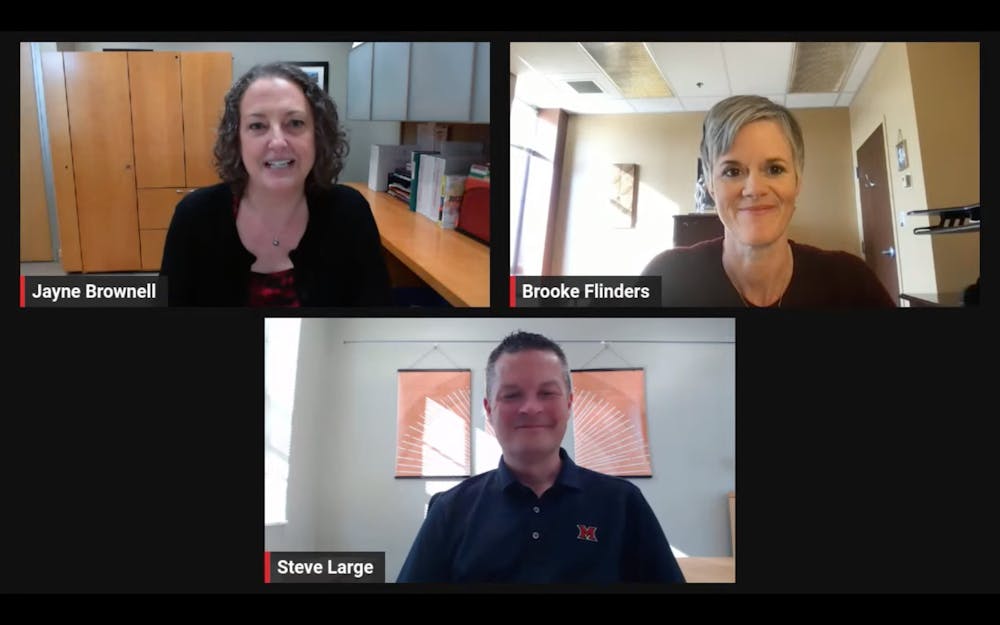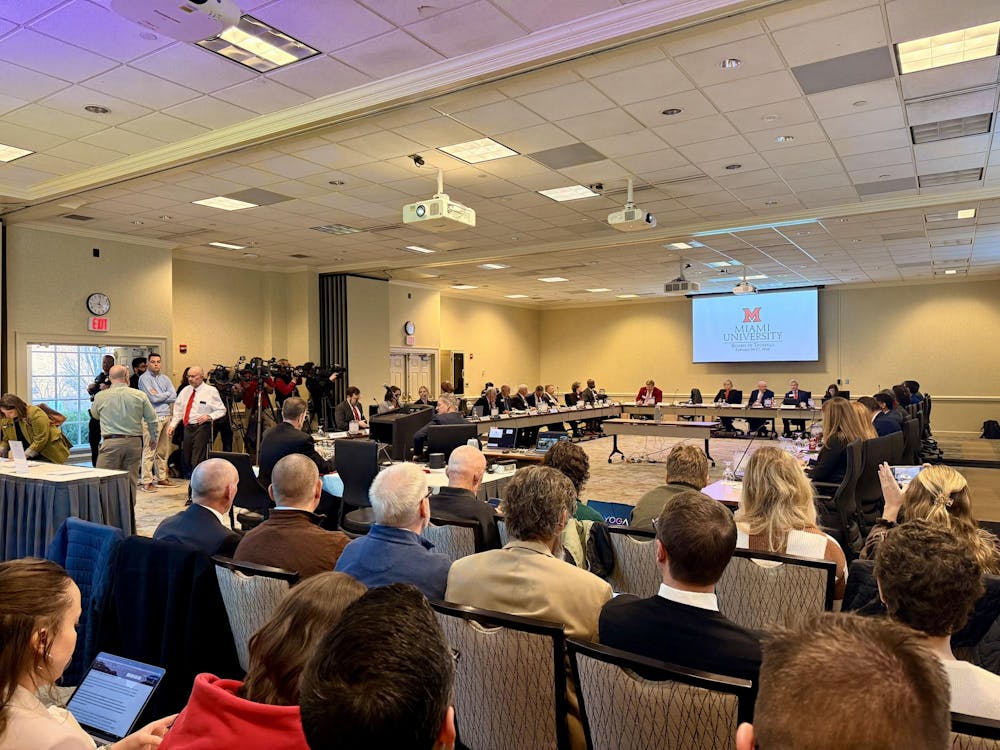Miami University’s mental health task force hosted a webinar on Tuesday, Sept. 19, to present its past work and future plans to support the well-being of students, faculty and staff.
The webinar was hosted by Jayne Brownell, senior vice president for Student Life, Brooke Flinders, regional associate dean for Academic Affairs, and Steve Large, assistant vice president for Health and Wellness in the Division of Student Life.
Brownell and Flinders sat as co-chairs of the Mental Health Task Force for the past year. Large co-chaired a community-focused group and will continue on as chair of a new mental health committee.
“We have a very different landscape around mental health now in 2023 than we did a few years ago,” Brownell said. “But we have been talking about mental health for quite a while.”
Brownell said mental health has been a topic of discussion at Miami since before the pandemic, and in the past 10 years, the university has doubled the number of counselors in Student Counseling Services.
Since the COVID-19 pandemic, the conversation has expanded to include faculty and staff as well.
“The people who provide the wellness and the support for students also need to be well themselves,” Brownell said. “Just the way that students have complicated lives … faculty and staff have complicated lives and they have their own challenges that go beyond their professional work.”
Miami President Greg Crawford initiated an investigation into student, faculty and staff mental health and well-being in 2022.
Mental Health Task Force focus areas and challenges
The six focus areas for the task force included: scope of the issue, prevention and education, communication, allyship and early detection, services and treatment, and follow-up care. Throughout these six areas, data, equity and culture served as subtopics.
Flinders said each group completed a Strengths, Weaknesses, Opportunities, and Threats (SWOT) analysis test and consulted with colleagues across Miami campuses about their findings.
These conversations included University Senate, Student Life Council, the Dean of Students Advisory Board, the President’s Executive Cabinet, the Council of Academic Deans, Student Success Center, the Parents Council and community partners. The task force also conducted a faculty and staff wellness survey and a student health survey.
Enjoy what you're reading?
Signup for our newsletter
The task force presented the mental health strengths, including areas for growth and diversity
“We know that we have some cultural strengths and to me this is one of the most important things as we move forward into next steps,” Flinders said.
In terms of weaknesses, the task force found that communication is an area to grow in — Miami has many resources, but students and faculty can have a hard time finding them.
Brownell also addressed matching student needs financially. She said the student mental health fee provides more resources, but it’ll take four years for those resources to become fully available because of Miami’s tuition promise. In addition to this, the task force found some cultural weaknesses even with the current strengths.
“One of the things that we know and that we heard is that not every group at Miami feels equally welcomed or equally supported, or has the same sense of safety and belonging,” Brownell said. “We also know that among different populations, stigma is getting better, but there are some populations where there is still quite a bit of stigma in seeking out care.”
The final challenge that the task force found was the difference between what students expect Miami to provide, and what is actually feasible.
“Students told us that then it leads to issues of trust,” Brownell said. “They wonder how much we care if what they’re expecting, we’re not able to deliver.”
Task force recommendations
The task force presented four categories of recommendations to continue expanding and prioritizing wellbeing: foundational structures, communication, education and commitment.
Brownell said a long-term committee will be established to make sure student well-being is continually thought about. The committee will also streamline the leave of absence process for students in distress. This includes supporting students while still at Miami, during their leave and through the process of coming back to campus.
To help with communication, Brownell stated that the task force aims to make information more accessible on the website through videos and articles, along with pushing these out through social media.
Brownell also said that the task force is exploring options to expand mental health education to student organization leaders in forms of toolkits similar to what resident assistants (RAs) currently have access to, along with adding mental health components to the Red Brick Rewards system.
Brownell said their goal is to reduce stigma and increase stamina.
“Let’s try to change our culture,” Brownell said. “So that we all could sustain ourselves and stay more steady and actually be able to get through the whole semester feeling like we are still intact and whole.”
Looking to the future of the mental health committee, Large discussed the makeup and roles of the new 30-person group. He said members will prioritize their recommendations within their unique subgroup or category and before implementation.
“The first phase of this committee is really prioritizing and implementing the task force recommendations,” Large said. “And then the next phase will come after that which will really involve developing what is the long term need and vision for the standing committee.”
The new committee plans to first focus on these recommendations and re-evaluate at a later date.




